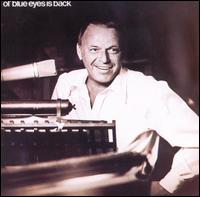This article includes a list of general references, but it lacks sufficient corresponding inline citations .(February 2023) |
| Ol' Blue Eyes Is Back | ||||
|---|---|---|---|---|
 | ||||
| Studio album by | ||||
| Released | October 1973 | |||
| Recorded | June 4 – August 20, 1973 | |||
| Studio | Samuel Goldwyn, West Hollywood, California | |||
| Genre | Traditional pop | |||
| Length | 35:54 | |||
| Label | Reprise FS 2155 | |||
| Producer | Don Costa | |||
| Frank Sinatra chronology | ||||
| ||||
| Review scores | |
|---|---|
| Source | Rating |
| AllMusic | |
Ol' Blue Eyes Is Back is a 1973 studio album by American singer Frank Sinatra.
Contents
Sinatra returned from his brief retirement with Ol' Blue Eyes Is Back. Released amidst a whirlwind of publicity, the album was a commercial success, earning gold status and peaking just outside the top-ten on the UK and Billboard album charts.
The album was accompanied by a television special, Magnavox Presents Frank Sinatra , which reunited Sinatra with Gene Kelly.
Genuine first pressings of the LP came with a bonus photo of Sinatra inside the cover.